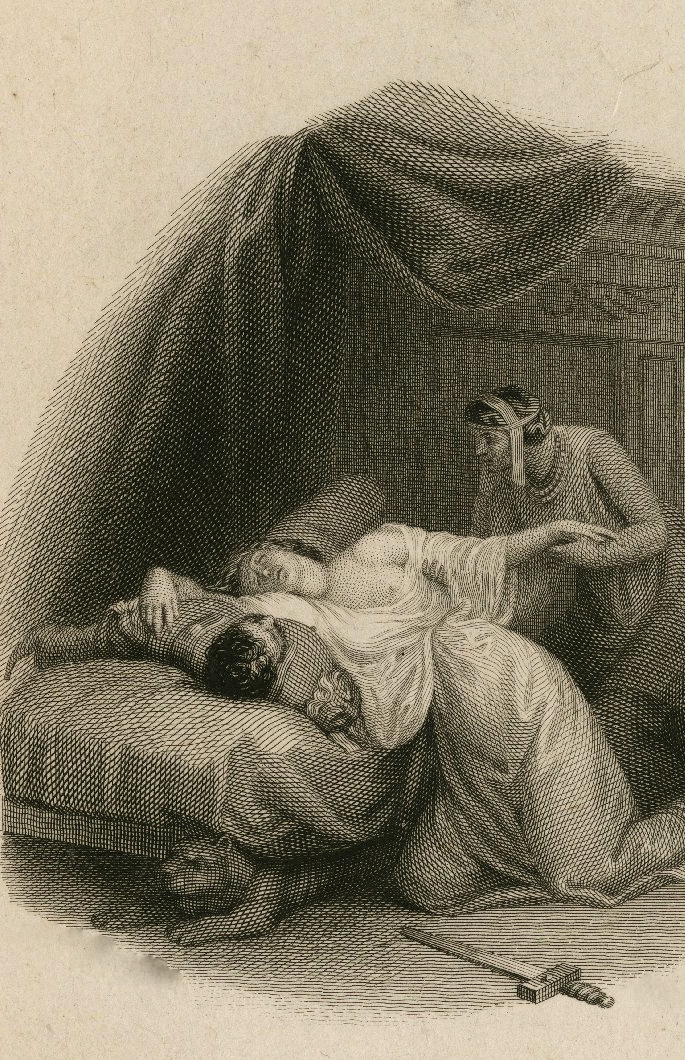One shouldn’t get too fancy about the meaning of this play by Shakespeare. It is not a subtle philosophical meditation on human existence. It is, instead, a rather simple and brutal drama based on the idea that human existence is a preposterous puppet play, that pomp and glory are strictly theatrical phenomena, and that sex is the only thing that matters.
The tragedy of the play is cheap melodrama, the philosophy is dime-store nihilism — but the poetry . . . the sublime poetry of the play is pure eroticism. It creates its friction, it achieves its climax . . . and it echoes forever through the ages.


From “Antony and Cleopatra,” Act II. Sc. 2.
Enobarbus.—The barge she sat in, like a burnished throne,
Burnt on the water: the poop was beaten gold;
Purple the sails, and so perfumèd that
The winds were lovesick with them; the oars were silver,
Which to the tune of flutes kept stroke, and made
The water, which they beat, to follow faster,
As amorous of their strokes. For her own person,
It beggared all description: she did lie
In her pavilion (cloth-of-gold of tissue),
O’erpicturing that Venus, where we see
The fancy outwork nature; on each side her
Stood pretty dimpled boys, like smiling Cupids,
With divers-colored fans, whose wind did seem
To glow the delicate cheeks which they did cool,
And what they undid, did.
Agrippa.— O, rare for Antony!
Enobarbus.—Her gentlewomen, like the Nereides,
So many mermaids, tended her i’ the eyes,
And made their bends adornings: at the helm
A seeming mermaid steers; the silken tackle
Swell with the touches of those flower-soft hands,
That yarely frame the office. From the barge
A strange invisible perfume hits the sense
Of the adjacent wharfs. The city cast
Her people out upon her; and Antony,
Enthronèd in the market-place, did sit alone,
Whistling to the air; which, but for vacancy,
Had gone to gaze on Cleopatra too,
And made a gap in nature.
AGR.— Rare Egyptian!
ENO.—Upon her landing, Antony sent to her,
Invited her to supper: she replied,
It should be better he became her guest,
Which she entreated. Our courteous Antony,
Whom ne’er the word of “No” woman heard speak,
Being barbered ten times o’er, goes to the feast;
And, for his ordinary, pays his heart
For what his eyes eat only.
AGR.— Royal wench!
* * * * *
MECÆNAS.—Now Antony must leave her utterly.
ENO.—Never; he will not:
Age cannot wither her, nor custom stale
Her infinite variety: other women cloy
The appetites they feed, but she makes hungry
Where most she satisfies. For vilest things
Become themselves in her; that the holy priests
Bless her when she is riggish.
Note: “Riggish,” per the OED, means lustful or promiscuous, especially as applied to a woman.
Gorgeous, but can it match Titania’s speech beginning, “The Fairyland buys not the child of me” in AMND?
that would be Act 2, scene 1, “A Midsummer Night’s Dream.” Like Portia’s “The quality of mercy is not strained” from “The Merchant of Venice,” It’s a favorite audition or elocution piece.
All good stuff. That Shakespeare had a world of talent.